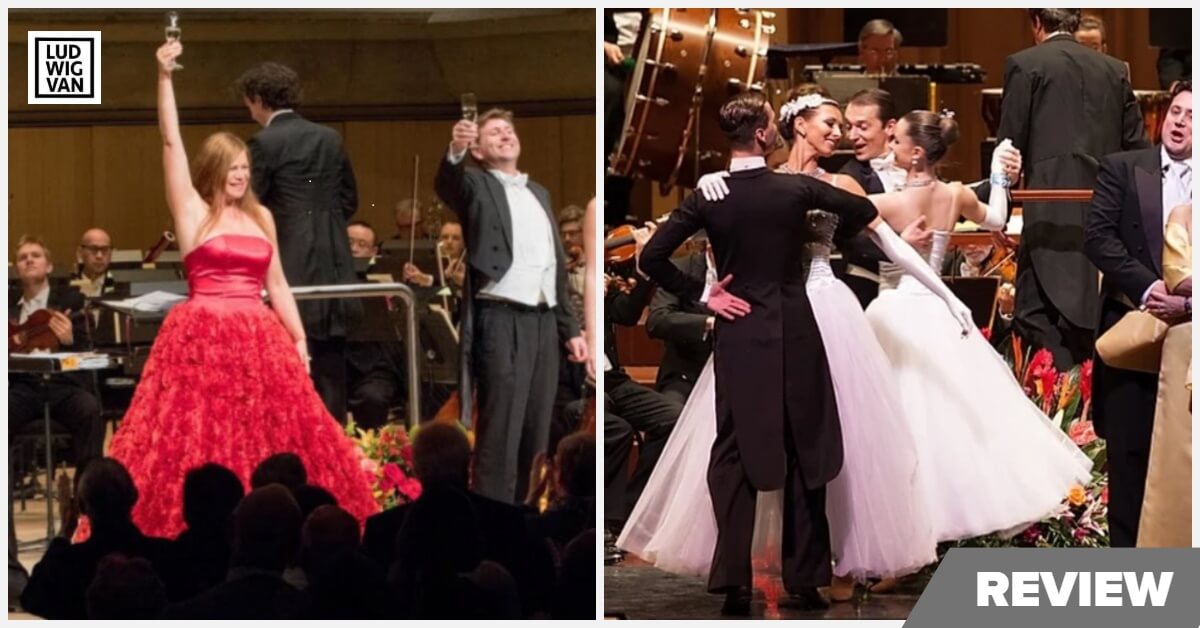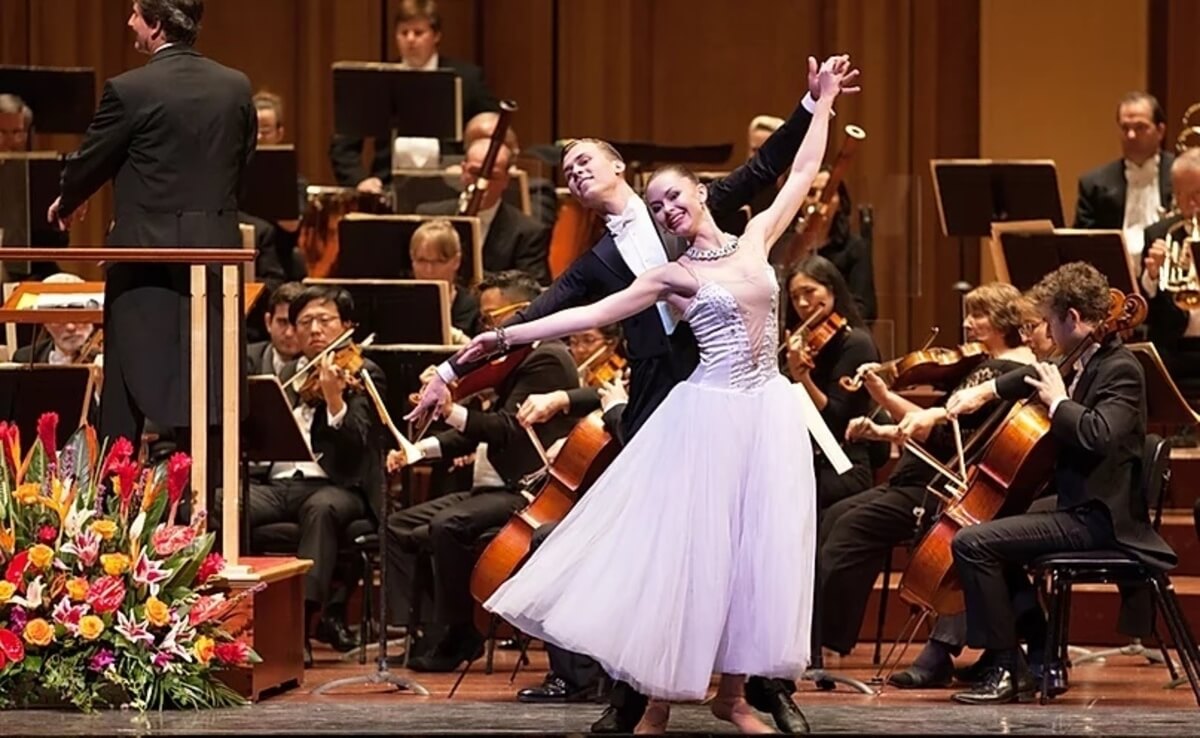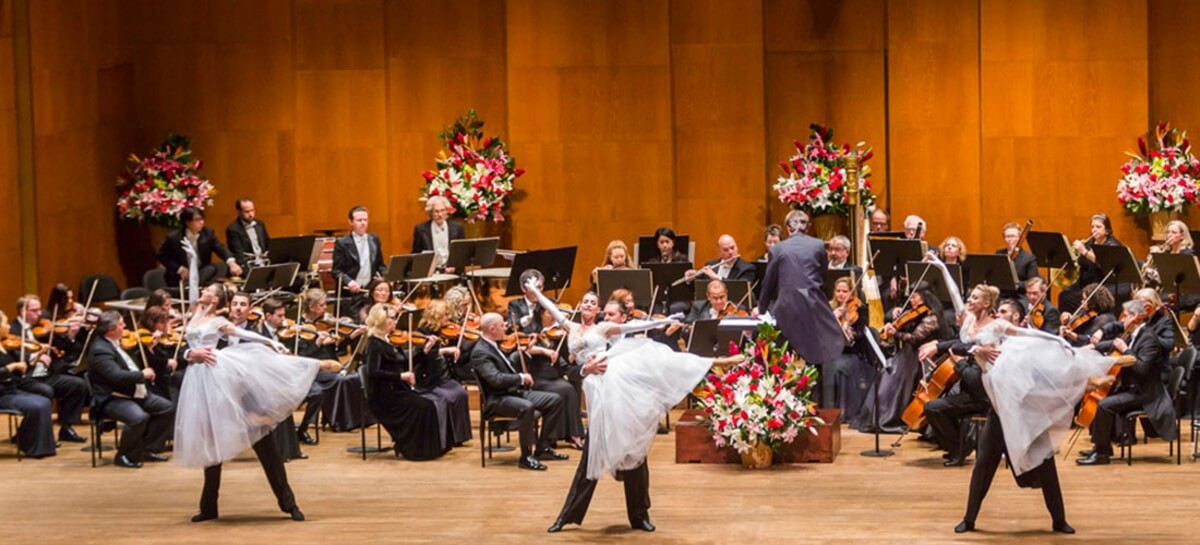Crowd pleasing programs and stellar talent mark Toronto’s beloved year-end/New Year classical music extravaganzas, Bravissimo! and Salute to Vienna.

Bravissimo!: Arias, duets and choruses from Il baribiere di Siviglia, Aida, Rogletto, Otello, La forza del destino, Don Carlo, Il trovatore, Le Villi, Les contes d’Hoffmann, La Gioconda, Adriana Lecouvreur, Carmen, and Turandot. Karine Babajanyan, soprano; Maria Kataeva, mezzo-soprano; Luc Robert, tenor; Michele Kálmándy, baritone; Rick Phillips, host; Michelangelo Mazza, conductor; Opera Canada Symphony and Chorus. Roy Thomson Hall, Dec 31, 2019.
Salute to Vienna: Works by Franz von Suppe, Emmerich Kalman, Johann Strauss Jr., Franz Lehar, Otto Nicolai, Augustin Lara, and Josef Straus. Micaëla Oeste, soprano; Tilmann Unger, tenor; Kiev-Aniko Ballet of Ukraine; International Champion Ballroom Dancers; Michael Zehetner, conductor; Strauss Symphony of Canada. Roy Thomson Hall, Jan. 1, 2020.
For the diehard music lover, there’s nothing quite like bidding farewell to the year just past and ringing in the new with a couple of musical extravaganzas. Thanks to the enterprising Hungarian-Canadian impresarios Attila and Marion Glatz, Toronto audiences have the luxury of just such a musical doubleheader in Bravissimo! and Salute to Vienna. The opera event is now in its 12th season, while Salute is in a most impressive 25th season, now seen in 26 cities across Canada and the US.
To me, these two shows are the musical equivalent of comfort food, designed for the ear and for the heart. Bravissimo! with its program of “opera’s greatest hits” is like filling up on one’s favourite main course(s). Salute to Vienna, chock-full of frothy operettas, lilting waltzes and lively dancing, is not unlike a divine Sachertorte mit Schlag, the perfect tonic after a night of revelry. In fact, there’s an entry form in the program for a chance to win an authentic Sachertorte from the Hotel Sacher Wien! How’s that for promotional savvy, folks?
Last year’s Bravissimo! conductor Michelanelo Mazza made a welcome return. Also back after a long absence was Quebec tenor Luc Robert, a former COC Ensemble Studio tenor. Making their first appearances were Armenian soprano Karine Babajanyan, who recently jumped in for Sonya Yoncheva as Tosca at the Wiener Staatsoper, and Russian mezzo Maria Kataeva who won second and audience prizes at Operalia last year. Rounding out the quartet was veteran Romanian-Hungarian baritone Michele Kálmándy.
The program consisted of Italian and French operatic crowd-pleasers. The first half was Rossini and Verdi, opening with Maestro Mazza leading the pick-up Opera Canada Symphony in a spirited rendition of the Overture to William Tell. The 40-member chorus, made up mostly of experienced COC Choristers, contributed idiomatic performances of pieces from Otello, Carmen, Il trovatore and Forza, all works staged by the COC one time or another. The only possibly new piece was “Rataplan” from Forza. Here the women choristers’ voices blended beautifully with “Preziosilla,” sung by Kataeva.
Elsewhere, the Russian mezzo impressed with her gleaming, youthful tone and impish stage persona in Rosina’s showstopper, “Una voce poco fa,” plus “Habanera” and “Seguidilla” from Carmen. A curiosity — “Habanera” was shared by Kataeva and Babajanyan, and they sang it beautifully. They also took on Mercedes and Frasquita in Kálmándy’s rousing Toreador Song from Carmen, with Kálmándy as a swaggering if stentorian Escamillo.
Armenian soprano Karine Babajanyan’s best moment of the evening? It was a tie — between her lovely and serene “Io son l’mile ancella” from Adriana Lecouvreur, and the Barcarolle from Les contes d’Hoffmann, with Kataeva as Nicklausse. In the more dramatic arias, such as the Il trovatore duet with Conte di Luna, or in “Ritorna vincitor” from Aida, her voice could sometimes sound pressed and unsteady.
Michele Kálmándy contributed a rousing “Largo al factotum” from Barbiere, rather over-the-top with his comic mugging, but it certainly put the audience in the mood. To my ears, he’s that rare breed, a true Verdi baritone, not unlike the late Louis Quilico in vocal heft. For fans of that fach, Kálmándy was extremely impressive as Rigoletto in “Cortigiani” when he let it rip.
I saved for last my comments on Canadian tenor Luc Robert, who left the COC Ensemble and has since gone on to a significant international career. The voice is now a true spinto, with impressive ringing tone. His Enzo’s “Cielo e mar” was terrific, complete with a huge high B at the end. Considering that Don Jose is his signature role these days, it was curious that he didn’t sing the Flower Song, opting for “Di quella pira,” which unfortunately ended with a fizzled high C. But he recovered well and brought the house down with the showstopper “Nessun dorma,” the near-obligatory ending to Bravissimo!.
With the formal part of the program done, the artists entertained the enthusiastic crowd with “Libiamo” from La traviata. The chorus came down from the choir loft to join the soloists for a toast, hopefully with real champagne, although it’s probably coloured water — these folks were working! The proceedings came to a close with the obligatory “Auld Lang Syne,” bouquets for the two female stars, and congratulatory handshakes from Marion and Attila Glatz who came onstage.

For those still with enough energy left after a night of revelries, the Salute to Vienna followed the next afternoon. As I had mentioned, this is the granddaddy of the Attila Glatz Concert Productions, now in its 25th season and seen in 26 cities. As usual, I got there early, mainly to avoid snarled traffic and underground garage hassles, but also to do some serious people-watching.
I don’t think I’m imagining it when I say the Salute audience is looking increasingly superannuated. Today I lost count of the number of people arriving with the aid of a wheelchair, walker, or cane. Typically, matinees attract an older crowd, given the ease of daylight travel, and the appeal of the programming. Kudos to the many older folks with mobility issues, still making the effort to come. But what about future seasons?
Salute to Vienna programming is best described as “comfortably predictable” and “appealingly formulaic.” Its unabashedly old-fashioned content is a big draw — two hours of music easy on the eyes and ears, helped in no small way by a chatty maestro. Last year it was the suave Alastair Willis, an old hand at Old World Gemütlichkeit. Well, it worked perhaps too well, as there were people around me humming along.
This year’s maestro is Michael Zehetner, a Vienna native. He spoke with a thick Austrian accent, but with enough English facility to make himself understood. A very fine conductor from the first downbeat onward, he led the pick-up Strauss Symphony (almost identical to the Opera Canada Symphony the night before) with a sure hand, drawing lovely sounds from the musicians. His “gift of the gab” is a work in progress, but good enough to charm most of the audience with his corny jokes.
One particularly amusing moment was his introduction of the famous “Meine Lippen, sie kussen so heiss” from Giuditta, roughly translated as “My lips kiss so hot.” He quipped, “Mine too!” and proceeded to kiss concertmaster Marie Berard, on the hand. He asked her, “How was it?” “Sizzling!” was her response, drawing laughter from the audience. Soprano Micaela Oeste, looking like a million dollars in a succession of costumes, and playing up the sex appeal, sang it beautifully.
Both Oeste and Tilmann Unger possess the requisite beautiful voices and physical attractiveness for their assignment, and the audience loved them. Curiously their voices also sounded uncommonly big. I don’t know for sure, but I strongly suspect they were miked. I saw some sort of an antenna pack sticking out from the top of the back of the soprano’s gown. Never mind — one comes to this show not to find out how loud they can sing, but for its entertainment value.
And entertain they did! Unger and Oeste sounded terrific in arias and duets, particularly in the encore “Wien, du Stadt meiner Traüme” by Rudolf Siecynski, an Austrian composer with Polish parentage. Is there a piece that better defines Old Vienna than the opening line: “Wien, Wien, nur du allein…” You don’t have to be Viennese to feel the atmosphere. The duo sang it beautifully. The tenor also showed off his Latin sensibilities in Agustin Lara’s “Granada,” earning him huge applause.

As to the dancing — it’s the Kiev-Aniko Ballet of Ukraine and the International Champion Ballroom Dancers again this year, and they never disappoint. All the dancers look like they are cut from the same cookie-cutter, with slim bodies, long necks and limbs that seem to extend forever, perfect in those Viennese waltzes. All very retro and very predictable, but it makes no difference. No matter how many times one has seen dancing to Strauss waltzes, it never goes stale.
There are some who feels the New Year’s Day concert tradition in Vienna and German-speaking countries in general should be put to rest, given its historical connection to the Third Reich. This argument was recently revived by music critic Ivan Hewett for The Telegraph.
While this review is not the place to discuss this in detail — and I won’t — a response is in order. Wagner was an anti-Semite, but it does not devalue the quality of his music. There are plenty of Jewish musicians and audiences who share this sentiment. New Year’s Day belongs to everyone, and celebrating it with music should be considered apolitical.
After the completion of the formal program, there were of course encores — the obligatory “Blue Danube” in a leisurely tempo, complete with elegant dancing. It was followed by yet another favourite, the rousing “Radetzky March,” and finally “Auld Lang Syne.” The audience went home happy, but for some of them, not until going straight to the box office to buy next year’s Salute to Vienna. That’s what I call dedication.
Happy New Year everyone!
#LUDWIGVAN
Want more updates on classical music and opera news and reviews? Follow us on Facebook, Instagram or Twitter for all the latest.



